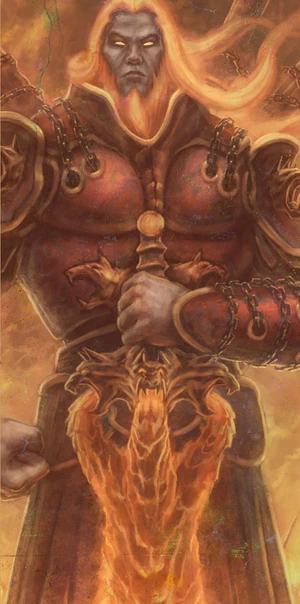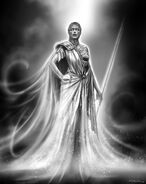
Ares, the first God of War.
| “ | And from that point forward, throughout the rest of time, whenever men rode forth to battle for good cause or for evil, they did so under the watchful eye of the man who had defeated a god. They were driven forward by Kratos, the mortal who had become the new God of War... | ” |
–Gaia | ||
The God of War is the title held by a god who is unmatched in battle tactics, having combat skills and superhuman godly-powers, which makes them a force to be reckoned with.
God of War Series[]
The title was first held by Ares, who was killed and overthrown by a demigod-turned-god, Kratos, in vengeance for the former's role in the latter's family's death. Later, Kratos would become a god himself as the God of War, but after he was (apparently) stripped of his godly powers and killed by Zeus, there was no one else to take the title of God of War. However, Kratos returns to life and reclaims his god-powers and status as the God of War before exacting revenge against Zeus, his father, and the Olympians, leaving Kratos as the only surviving Greek God of War (despite trying to commit suicide by impaling himself with the Blade of Olympus to give away the power of Hope) after killing almost all the gods in Greece before migrating to the Norse Realm.
The powers or abilities of the God of War are the same as any other of the powerful gods' powers, however they are more brutal and violent in nature.
The ability to set massive armies on fire, giving them protective abilities of fire, and destroy entire cities on a whim are just some of these abilities. Other abilities would include immortality and invincibility, absorption, elemental power, reality warping, flight, pyrokinesis, telepathy, telekinesis, enhanced senses, mastery of any weapon, etc.
The power to grow to the size of a Titan is also another power demonstrated by both Gods of War. Zeus also showed this power, meaning it is not just limited to the God of War. The God of War is so powerful that they are almost on par with the three main gods: Zeus, Poseidon and Hades.
Interestingly, Týr, despite being a god of war is a pacifist and a diplomat. Instead of starting and fueling conflicts, he instead used his abilities to prevent them and even suggested that all races from all the nine realms should cooperate to ensure everlasting peace and even prevent Ragnarok.
Tyr decides to invite Kratos to Valhalla to prepare him to take the throne of the God of War of the Norse lands. Kratos in Valhala confronts his past and after fighting with Tyr several times, reconciles with his past by informing Freya that he agrees to her proposal to become God of War of the Norse lands.
Trivia[]
- All Greek gods of war (including goddesses) have rebelled against the rule of Zeus, as Ares threatened the Gods of Olympus in God of War, Kratos fought Zeus himself in God of War II and III, and Athena aided Kratos in God of War III.
- Out of all the Gods of War, Kratos was the most powerful and fearsome one, since he had the powers of Pandora's Box, the powers of the God of War that belonged to Ares, and plenty of weapons and magic from the other gods and the knowledge to use the godly powers by Athena after the death of his brother. This was proven by Zeus being the only one to interfere, not before trying to convince Athena to do so due to the latter being the closest divinity to Kratos, and certainly the only one that he would not want to harm.
- It is interesting to note that the first God of War game ending implies that Kratos is the god of war until today, as screenshots from battles in the Crusades, the American Civil War, World Wars I and II, and war in modern times, are shown. But, as one can see on the sequel, Kratos' reign was cut short by Zeus. This may have been because the developers did not know whether they would make a sequel (of that kind, because the sequel was clear, the plot of that sequel was not the clear matter), could have been future images of what might have been, or could very well be true, given the implication that Kratos survived his apparent suicide at the end of God of War 3. Interestingly Kratos is considered a god in the new God of War game, loosely based on Norse mythology.
- In the God of War novel, it could also be explained by this reason. Kratos saw destiny as it would be, but when he died, he rebelled against Olympus by refusing to stay in the Underworld thus changing his fate (or more accurately, earning a new one because his death was not avoided, it was just he was still alive) and then making the process to regain his powers, not avoiding death but instead gaining a new life from that point. Since Kratos altered fate in that point, all the events and connections that should have been were erased, so Kratos by killing Perseus changed his fate) and thus, those wars predicted never existed (at least, those wars have not existed within the rule of gods)
- In the God of War Ragnarok DLC expansion God of War Ragnarok Valhalla, Kratos agrees to Freya's proposal to become the God of War of the Norse lands. So technically speaking, Kratos will once again sit as God of War for all time which makes the ending of the first game relevant again.
- It is interesting to note that a god of war has died at the ending of every God of War game in the main series. Ares in God of War, Athena in God of War II and Kratos seemingly in God of War III. But Kratos somehow survived the attempt on his own life and eventually had a son, and he is the only god of war who survives.
- If it is based on real-world mythology, technically all Aesir gods are war deities, whether as their main or secondary area of activity, since the tribe of Aesir gods are essentially warrior gods, and are related to the war of various forms. What is related to real-life Nordic culture that valued war and warriors
- However, using the game's logic, despite many of them being war deities, only Tyr and now Kratos are "the god of war"








